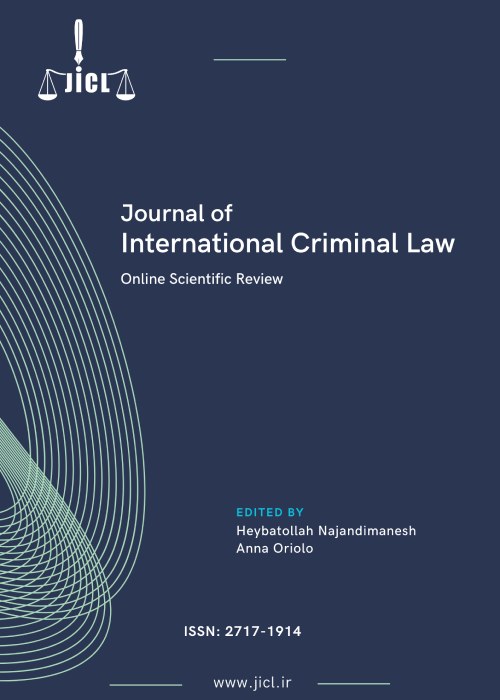فهرست مطالب

Journal of International Criminal Law
Volume:4 Issue: 1, Winter 2023
- تاریخ انتشار: 1402/01/12
- تعداد عناوین: 4
-
Pages 1-27Ecocide as a possible new crime and, eo ipso, candidate for international norm-recognition is gathering momentum in the contemporary era among observers and commentators. In legal and evolutionary terms, however, such support for the idea of accommodating and adopting ecocide as a core international crime is no guarantee of success. It is up to the Member States to the Rome Statute for the International Criminal Court to decide for or against. This reality which links law and politics, together with other types of conventional facts and theorizing have influenced the debate and dispute. With the use of examples from the responses and perspectives of legal professionals and scholars, the two authors of this article capture the multidisciplinary maze that ecocide and legal doctrine form part of. By emphasizing the role of philosophy, critical aspects pertaining to human rights and other key areas of importance are accentuated. Unfortunately, the multidisciplinary maze may be a vicious circle, without much potential for progressive transformation.Keywords: Business, Barriers, crime, Ecocide, multidisciplinary
-
Pages 28-40The present study develops the theme of ecocide, a recent approach to conducts that aim at natural environments, wiping out ecosystems, wildlife, changing climate and impacting indigenous peoples’ lives in natural lands. For that, we initiate the discussions with the crime of genocide, widely consolidated within the Rome Statute, the funding legal document of the International Criminal Court, approaching its historical roots, as well as its conceptual and factual developments. Later, we debate the recent emergence of the concept of ecocide, detailed by scholars and international legal forums as a method of genocide, that is, when the destruction of ecosystems is capable of causing the annihilation of social groups. The main question this essay tries to answer is whether international criminal protection of the environment, through the crime of ecocide within the International Criminal Court’s jurisdiction, is the most urgent and important development in international criminal law. All in all, this work advocates for the consideration of ecocide as a crime against humanity by itself, as well as for the recognition of the environment as a subject of law, an emerging and urgent need for the future of International Criminal Law. KEY-WORDS: Ecocide; Genocide; Environment; Crime; CourtKeywords: Ecocide, Genocide, Environment, crime, Court
-
Pages 41-58The aim of this paper is to critically review the debate on the universal jurisdiction principle and makes a case for the enhancement and continuous adoption of universal jurisdiction for international crimes with particular concern on the resistance from Africa. The researcher uses descriptive and prescriptive analysis while relying on library-based or desktop research methodology to achieve the aim of this paper. Importantly, this study contributes to knowledge as it recommends the need to continue the application of universal jurisdiction in the prosecution of international crimes irrespective of the elite’s sponsored resistance against the principle in Africa.Keywords: Africa, universal jurisdiction, International Criminal Law, War Crimes, United Nations
-
Pages 59-72When a nation passes Holocaust denial laws there are myriad reasons for doing so. One of the reasons often cited is to preserve the memory and honour of the victims. If this is true, then it would be likely that the number of Holocaust related deaths would affect the likelihood of a country having denial legislation. Those countries suffering more Holocaust-related deaths would have a greater impetus to pass denial laws in order to preserve the memory of the Holocaust and its victims. The logistic regression analysis shows support for the idea that the number of Holocaust related deaths are influential.Keywords: Holocaust, denial, logit, Laws


